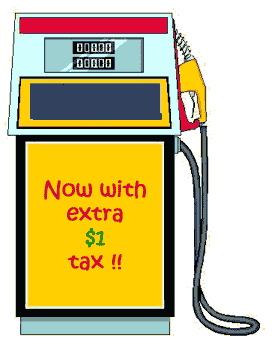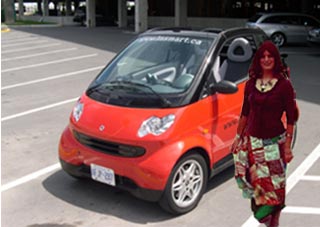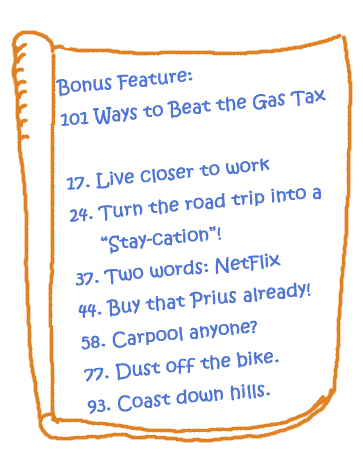 Carbon tax
Carbon tax
A carbon tax (or gasoline tax) is even more straightforward. Let's say the government collected a $1 tax on every gallon of gasoline sold in the United States. They collect this money in a huge bank account (or whatever it is that governments use), and at the end of the year they divide it up evenly among the entire population of the United States. Thus, on average, the gasoline "tax" doesn't cost a taxpayer anything. But, if I use more gas than most people (maybe I like to travel, or maybe I drive a gas-guzzler), then I will pay a lot at the pump, but only get an average amount back. The gas tax costs me money. Or, if I use less than average (I bike to work and take the metro to the movies) then I pay very little at the pump but get a big rebate at the end of the year. I actually make money on the "tax."
So let's be a little more specific. The average American driver buys 800 gallons of gas a year, which he (or she) uses in a 20-mpg car to go about 16,000 miles. How much would this theoretical average person pay for a dollar-a-gallon gas tax?
Now let's think about 2 sort-of real people, Executive Ed and TreeHugger Trish. Executive Ed drives (well, actually, his chauffeur drives) a stretch Hummer that gets 8 miles per gallon. His daily commute to work is 20 miles each way, and then there's all that wining and dining, for a total of 30,000 miles driven per year. You've probably noticed that his gas mileage is worse than average AND he drives farther than average as well. So, what's Ed's gas tax?
And then there's Treehugger Trish. She takes the Metro to work, walks to her local organic food store, and rents a smart car for an occasional weekend jaunt to save-the-squirrels festivals. Altogether she drives only 4,000 miles, in a car that gets 40 mpg. In other words, unlike Ed, she does better than the average on both miles driven and miles per gallon. What's her gas tax?
And how about the bottom line? Here are our two lucky contestants:
 |
 |
|---|---|
Tax Paid: $3750 Tax Rebate: $800 Bottom Line: -$2950 |
Tax Paid: $100 Tax Rebate: $800 Bottom Line: +$700 |
Looks like Trish is actually making money on the "gas tax". And that's the way it's supposed to work. A gas tax, unlike a call to conscience, can provide individuals with the right incentives for conserving resources. On the other hand, no one will force Executive Ed to reduce his driving or to get a smaller car -- if he cares enough to want to pay the extra tax, he can do it.
 A gas tax would almost certainly result in less gas being used overall, though when the price of gas goes high enough, people do reduce their driving. This will not happen with a call to conscience alone -- despite many such calls, the number of miles driven in the US rose consistently -- until Hurricane Katrina pushed prices to $4 per gallon.
A gas tax would almost certainly result in less gas being used overall, though when the price of gas goes high enough, people do reduce their driving. This will not happen with a call to conscience alone -- despite many such calls, the number of miles driven in the US rose consistently -- until Hurricane Katrina pushed prices to $4 per gallon.
Copyright University of Maryland, 2007
You may link to this site for educational purposes.
Please do not copy without permission
requests/questions/feedback email: mathbench@umd.edu